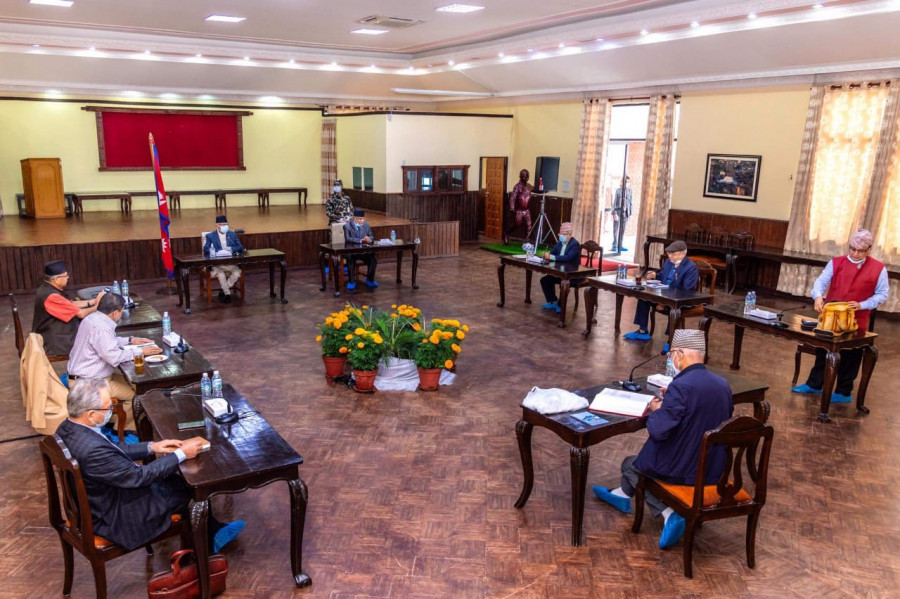Editorial
Becoming citizens
We need to go beyond the spatio-temporal debate on citizenship and ask whether its ideals are being fulfilled.
The parliamentary State Affairs and Good Governance Committee on Sunday endorsed the bill to amend Clause 5.1 of the Citizenship Act 2063, recommending a seven-year cooling period before providing a foreign woman married to a Nepali man with naturalised Nepali citizenship. The ruling Nepal Communist Party is set to press its way through the parliamentary process owing to its numerical strength despite opposition from several parties in the house and rights activists outside. There is little sense in Home Minister Ram Bahadur Thapa's claim that providing naturalised citizenship to a foreign woman immediately after marriage is detrimental to the country’s security, progress and existence. Also, there is little sense in the contention of some opposition parties and activists that the seven-year period is especially restrictive for Indian women married to Nepali men. While Thapa’s trivialisation of a deeply political-philosophical idea of citizenship is indefensible, the opposition’s fulminations eclipse the fact that the provision is restrictive for women from all over the world married to Nepali men.
Beyond the specifics of that particular clause in the Act, what we seem to be missing is a nuanced debate on the idea of citizenship itself not just as a legal entitlement but also as an ideal for making a humane society of citizens. We must ask whether citizenship helps provide a sense of identity, belonging, ownership and social justice to the citizens notwithstanding whether they got the citizenship certificate by naturalisation or by descent. What should be of greater concern is whether a foreign woman married to a Nepali man enjoys equal social entitlements as a human being apart from her legal entitlement as a certified citizen. The hierarchies that form the Nepali society today make it difficult for any woman to enjoy her human rights to be at par with her male counterparts. The question of when to provide naturalised citizenship to a foreign woman married to a Nepali man is incomplete unless we also ask whether those who already possess citizenship-by-descent are allowed to ‘belong’ within the country itself.
It is pertinent, then, to revisit the famous debate between two Indian philosophers of the 20th century, Mahatma Gandhi and BR Ambedkar. 'Gandhiji, I have no homeland', Ambedkar once told Gandhi, concerned as he was with millions of Indian Dalits like himself feeling ‘homeless’ in a country whose citizenship certificates they possessed. When Gandhi responded that Ambedkar did indeed have a home and that he was also a 'patriot of sterling worth', the latter elaborated what made him and his fellow Dalits feel homeless in India. 'You say I have got a homeland, but still, I repeat that I am without it. How can I call this land my own homeland and this religion my own, wherein we are treated worse than cats and dogs, wherein we cannot get water to drink?' Ambedkar asked Gandhi. 'No self-respecting Untouchable worth the name will be proud of this land'. In Ambedkar's response to Gandhi's rather flimsy remark lies a profound question as to what makes a country worth living and fighting for.
A country that cannot make its citizens feel ‘at home’ is no country to begin with, no matter whether it provides its residents with a citizenship certificate immediately or after seven years or even 15 years. Excessive reliance on the idea of citizenship as legal entitlement eclipses the idea of citizenship in its truest sense. Today, a wide section of Nepalis who have been historically marginalised for being Dalits, Adivasis, Madhesis, religious minorities, poor and geographically disadvantaged are denied citizenship certificates—and whatever benefits that may accompany them—due to the incompetence and negligence of politicians and administrators. Unless those at the bottom of the citizenship pyramid ‘become’ citizens—not only legally but also, and more importantly, socially—the debate on citizenship remains incomplete as well as lopsided. The current debate on citizenship should, therefore, shed its preoccupation with spatio-temporal concerns and ask whether existing conditions within the country allow for each individual, irrespective of their national, religious, linguistic, class, caste and gender allegiances, among others, to be treated as an equal member of the society.



 8.79°C Kathmandu
8.79°C Kathmandu














